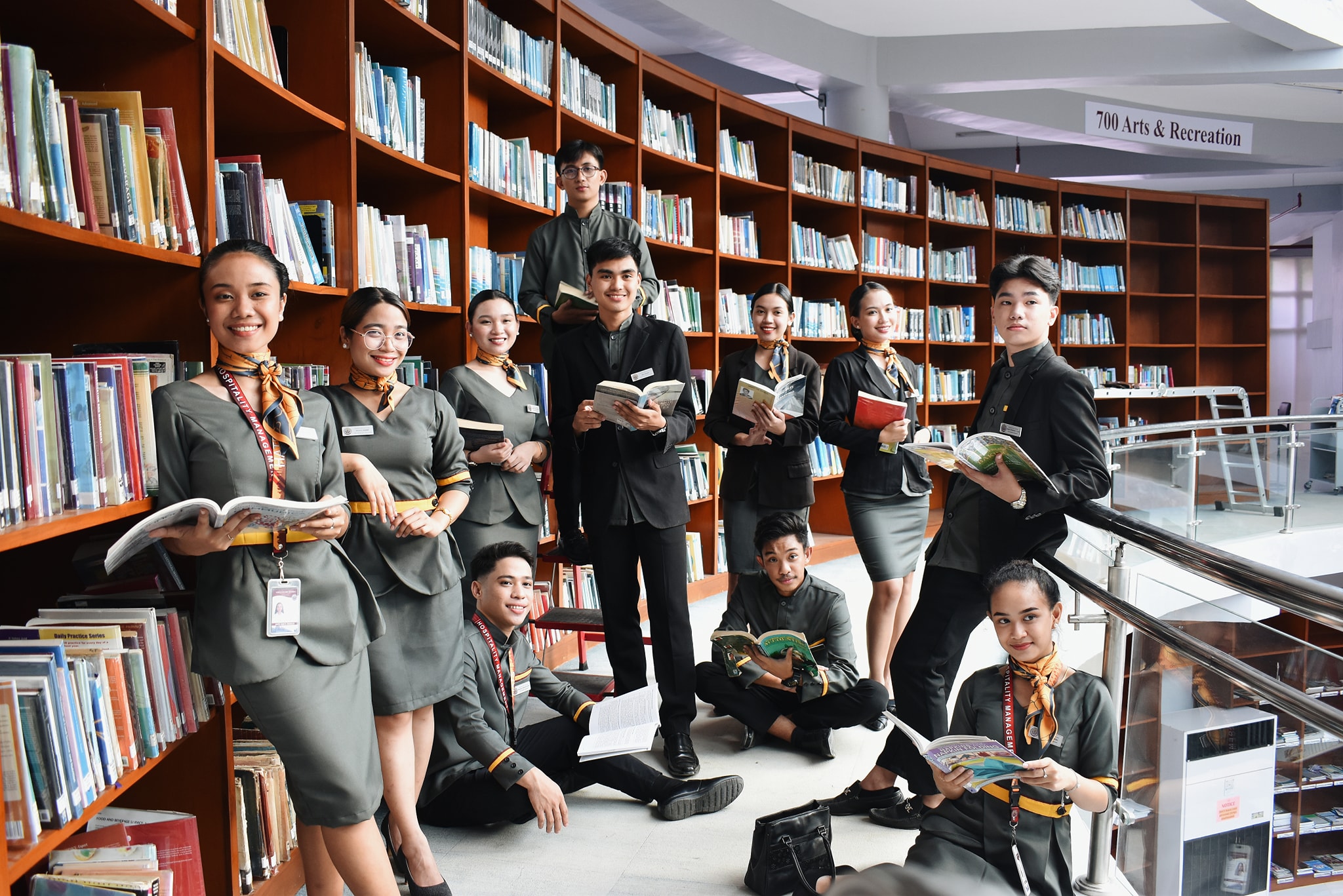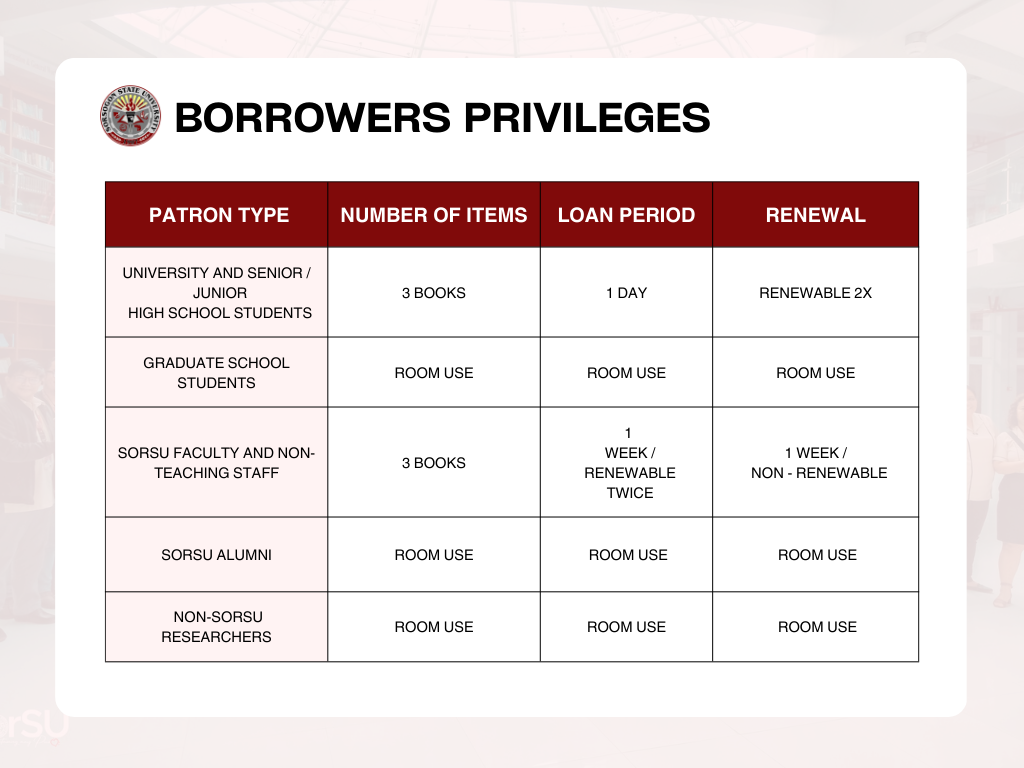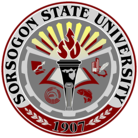
SorSU LIBRARY POLICIES AND GUIDELINES
BOR Res. 70, s. 2023
This SorSU library offers quality services to its clientele in support of the vision, mission, goals, and objectives of the institution.
It shall provide efficient access to various references and relevant information for clients’ lifelong learning.
All currently enrolled students of Sorsogon State University may avail themselves of the privileges to use the facilities and services of the library. The validated library card for the current term is required, pending the library system’s availability on all university campuses.
The campus libraries are open during regular school days with the following schedules:
Bulan Campus
8:00 AM – 5:00 PM (NO NOON BREAK)
Monday – Friday
Castilla Campus
8:00 AM – 5:00 PM (NO NOON BREAK)
Monday – Friday
Magallanes Campus
8:00 AM – 5:00 PM (NO NOON BREAK)
Monday – Friday
Sorsogon City Campus – Engineering Library
8:00 AM – 5:00 PM
Monday – Friday
Sorsogon City Campus
8:00 AM – 5:00 PM (NO NOON BREAK)
Monday – Saturday
- Please respect others’ need for quiet while inside the library. Silence must be observed in the library.
- Cell Phones shall be on silent mode.
- Large bags, briefcases, envelopes, binders, folders, and packages should be deposited at the package counter. All valuables are the responsibility of the users. The staff shall not be held responsible.
- Cleanliness and orderliness shall be observed.
- If a student wants to use the library after regular library hours, they must first write a letter to the librarian a day before the said schedule requesting the extension of their study.
- The students shall take care of books and materials to be borrowed and used in the study area.
- Students, faculty and non-teaching staff should promptly return borrowed library materials. Books and other overdue library materials shall incur a fine.
- Libraries are closed during Sundays and holidays. Library service stops 30 mins before the regular closing time to enable the staff members to check records and collection in preparation for the next day’s routine. Changes in library hours are posted in advance at the entrance of the libraries.
- Users shall abide by the library policy approved and published in the library handbook.
Borrowers privileges

- A maximum of three (3) circulation books may be borrowed overnight.
- General references like dictionaries, encyclopedias, atlases, magazines, and journals are for room use only.
- Dissertations, theses, feasibility studies, and rare book collections are for room use only. Users are required to observe the Copyright Act.
- Fiction books may be borrowed for one week.
- No book or library materials may be brought out without the librarian’s permission.
Borrowing procedures
1. Fill out the book card, which can be found at the back of the book.
2. Students shall attach their valid library card and the book card for proper issuance (for campuses without a library system).
3. The library staff shall validate the entries in the book card with the library card prior to the release of books.
Returning procedures
1. Present the book/s to be returned to the library staff.
2. Wait for the confirmation of the book returned to clear the transaction.
Note: The library staff will then scan the valid ID and book once the library system is in place to ensure the proper issuance or return of library materials.
Lost book
In the event of misplaced books, it is imperative to procure replacements that correspond precisely to the original copies in terms of title, edition, and authorship. In the event that the first condition is not applicable, it is possible to substitute a book on the same topic or a closely related topic, as long as it is the most up-to-date version available.
E-lib services
In the digital era, e-Library represents a significant transformation in how information and knowledge are accessed and shared. Available online databases and other electronic resources can be accessed at the e-library station. Students and faculty laptop users may utilize the e-Library station for internet access. The student must register on the logbook to utilize the services.
Audio visual room
The primary purpose of the audio-visual room is for the students to utilize audio-visual materials that support their academic work. It houses cd and dvd used for instruction, independent learning or entertainment. It has a projector, laptop, and audio/video devices. In addition, there is a space for group viewing that can accommodate up to twenty (20) students per session. All SorSU students are allowed to use it. All procedures are designed to ensure that service is effective and efficient.
Procedure for availing the Audio-Visual Materials
1. Check room availability by working with library personnel.
2. Make reservations no later than one week beforehand.
3. Submit a request letter that specifies their educational objective, with an approval noted by their professor.
4. Wait for reservation confirmation.
Virtual library office
Through virtual channels, such as email and messaging, librarians and library staff offer reference and research assistance. Users may ask questions, seek research guidance, and receive assistance with their information requirements. The library service is accessible through the Facebook page of the SorSU library.
https://www.facebook.com/sorsogonsulibrary
Online Book Reservation and Borrowing
The process of reserving a physical book from a library through online platforms makes it simpler for users to obtain a copy of a book they wish to read without having to physically visit the library. The online reservation form is accessible via the SorSU library’s Facebook page.
Visiting researchers
Students, faculty members, and other researchers from other institutions must present a valid ID and a referral letter from the librarian of the institution where they come from. Alumni of the university can access library services upon presentation of the Alumni ID card issued by the Sorsogon State University Alumni Association.
Referral letter
Sorsogon State University students who wish to go to other libraries to supplement their research should seek a referral letter from the Chief Librarian. The referral letter should be duly signed by the librarians, who endorse the students visits to other libraries.
COLLECTION DEVELOPMENT POLICY
Criteria for Deselection of Materials
(Adopted form Linda M. Tayona)
The criteria used to identify titles for deselection from the collection are viewed on a regular basis first by the Collection Development Librarian and then the appropriate library department heads.
The criteria used are:
a. Superseded editions of general collection titles become candidates for deselection. Decisions to withdraw are made on a title-by-title basis.
b. Damaged, lost, and long-overdue general collection titles become candidates for deselection.
Decisions to withdraw are made on a title-by-title basis by appropriate library coordinators in consultation with the collection development librarian.
a. General collection titles acquired prior to 1975, which have not circulated since then become candidates for deselection.
The reference section has established specific deselection policies for many of the reference titles for which revised or superseded editions are regularly received. Superseded editions of titles for which policies have not been formulated become candidates for deselection.
- Periodic evaluation of the works already in the reference collection is as important as acquisitions of new materials, since the reference collection is a working collection of important, frequently consulted publications. Careful, regular and systematic deselecting remove older and less desirable works from the reference collection.
- The reference collection follows the same principles and guidelines in deselecting as in acquisitions of the new materials. Since each discipline covered by the reference collection requires different types of materials, it is impossible to establish absolute standards to be followed. However, some general criteria which should be considered in deselecting are:
1. Significance of the publication
2. Age and currency of the publication
3. Availability of later edition
4. Physical condition of the publication
5. Duplication of the contents in more recent works.
6. Language of the publication
a. The reference collection is deselected in two ways: automatic deselecting of older editions of a work and periodic deselecting of superseded edition by librarians. The reference collection is deselected systematically each year under the direction of the “Reference Collection Committee”. The following procedures are followed:
1. A schedule for the review of the collection is drawn up at the beginning of each fiscal year.
2. Each member of the Reference Section and/or Reference Collection Committee reviews titles in the designated section placing deselecting slips in those items which should be considered for deselection from the reference collection.
3. At the end of the designated time period, final decisions will be made by the Reference Collection Committee. The Reference Collection Committee may seek the opinions of appropriate members of the faculty and other library staff members as needed in making deselection decisions.
Superseded editions of materials housed in the government documents collection become candidates for deselection. All documents which have been in the collection for five years become candidates for deselection. Decisions to deselect are also made on a title-by-title basis.
Each year, faculty and librarians review serial holdings and evaluate titles based on frequency of use. Frequently used serials are important. Those that are infrequently used and are irrelevant to the curriculum are recommended for weeding. Serials are weeded biannually.
The recency, quality, relevance, number of copies, and frequency of use of audiovisual materials, accuracy are important factors considered for weeding.
Outdated materials are removed from the file to update the collection. Demand, content, accuracy and physical conditions are also considered.
Discarded materials are stored in a room for future use, for proper disposal or recycling.
Contact us!
Connect with the SorSU Library Facebook Page, email us at [email protected] or visit us at our address, SorSU University Library, Magsaysay Street, Salog (Pob.), Sorsogon City, Sorsogon.
